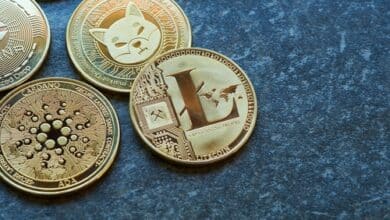Decentralization Will Continue to Advance in the Future With Application-Specific Blockchains

Blockchain is an innovative technology in today’s digital landscape. It ensures the safety of digital ledgers for various cryptocurrencies, such as Bitcoin (BTC) and Ethereum (ETH), in different sectors. The projected growth of the global market is staggering, with estimates indicating a significant increase from $5.88 billion in 2021 to a whopping $1,314.03 billion by 2030. This translates to an impressive compound annual growth rate (CAGR) of 82.4%.
They are introducing specialized blockchains for specific applications. These platforms stand out in terms of performance, scalability, security, cost-effectiveness, and governance when compared to general-purpose applications, playing a crucial role in shaping the future of decentralization. With the rapid growth of this industry segment, these specialized blockchains offer great potential.
This guide delves into the influence of blockchains that are tailored for specific applications. Please continue reading to discover why they represent the future of decentralization.
The Most Important Reasons Why Application-Specific Blockchains Are the Best Option
Application-specific blockchains are unique types of blockchains that are specifically tailored to run a single application rather than constructing an application using an existing blockchain. These platforms have been developed from scratch with unique features, including customized virtual machines and consensus mechanisms. Simply put, these are not codes that have been written on a blockchain platform designed for general use.
Clearly, blockchains tailored for specific applications are created to serve individual decentralized applications (dApps). DApps are software applications that operate on a blockchain or a decentralized network of computers rather than being confined to a single computer.
There are two distinct categories of blockchains: layer-1, which coordinates consensus and execution on the same layer, and layer-2, which separates execution from consensus. Avalanche Subnets, Polygon Supernets, and Cosmos Zones are just a few instances where you can employ these tailor-made blockchains to promote decentralization.
It’s fantastic that the blockchain industry has a rich background of internal backing from industry players and critical developers. These investments in blockchain technology offer skilled developers valuable chances to build platforms tailored for specific applications. There are multiple practical methods available for seeking blockchain funding, including bootstrapping, venture capital, and crowdfunding.
Specialized blockchains can play a crucial role in creating less centralized networks. Here’s why they represent the future of decentralization:
The Modification and Optimization of the Platform Is Made Possible by Them
With the increasing adoption of web3 technologies, developers can now tailor blockchain features to suit their specific needs using application-specific blockchains. This customization is especially advantageous for business applications. Companies may have unique chain requirements with particular characteristics that these platforms can assist in optimizing.
As an illustration, Re.al has introduced blockchain platforms for real-world assets (RWAs). They tackle enduring obstacles in decentralized finance by offering a customized remedy for overseeing assets such as properties and commodities. By creating its own blockchain platform, Re.al enhances its infrastructure, enabling easier trading of assets while ensuring smoothness and compatibility.
They Ensure That the Platform Is Secure in Terms of Both Data Privacy and Network Security
Blockchains designed for specific applications enhance network security and safeguard data privacy. By seamlessly integrating artificial intelligence (AI) and blockchain technology, networks can be effectively protected, and valuable information can be kept secure. Although AI offers advanced data processing capabilities, blockchain ensures the integrity and transparency of data through a safe and decentralized ledger.
When it comes to logistics and supply chain management, utilizing a blockchain to safeguard AI information offers unparalleled data integrity and precision throughout the entire supply chain. This guarantees the prevention of any unauthorized alterations while simultaneously guaranteeing adherence and the ability to track the process.
The media and entertainment industries utilize identical technology. Decentralized AI networks on blockchain enable producers and consumers to establish direct communication, ensuring utmost privacy and security.
Utilizing Them Gives You the Ability to Scale Programs up or Down
Specialized blockchains for specific applications offer the advantage of adaptable scalability, enabling platforms to easily adjust their capacity based on the level of demand they experience. As an illustration, EY’s blockchain solution, the EY OpsChain Contract Manager (OCM), streamlines intricate agreements, lowers expenses, and enhances security.
Blockchains designed for specific applications have distinct characteristics compared to smart contracts, which are codes that execute automatically on blockchains with broader functionality. Smart contracts streamline and uphold agreements between parties without altering blockchains’ fundamental characteristics. Nevertheless, it is crucial to undergo a thorough examination of smart contract codes to identify and rectify any potential security vulnerabilities or issues.
Based on the findings of Grand View Research, it is projected that the worldwide intelligent contracts market will experience substantial growth, increasing from $684.3 million in 2022 to a staggering $73,773.0 million, with a remarkable compound annual growth rate (CAGR) of 82.2%. Although the expansion of this market has the potential to facilitate future scalability in blockchain technology, the application-specific blockchain can provide even more significant benefits.
They Provide Cost-Effective Transactional Fees While Maintaining Optimal Efficiency
Specialized blockchains offer financial advantages by reducing transaction costs while ensuring optimal performance. They also lower expenses by removing unnecessary features and directing resources toward essential functions.
In Web3, validators on platforms such as ETC are entitled to a substantial portion of the transaction fees and revenue generated by interactions with Defi apps. Nevertheless, decentralized finance applications on native chains can retain the entirety of protocol expenses, enabling them to derive more value from their operations.
In addition, blockchains tailored to specific applications enable those applications to align token pricing with the intrinsic value of the underlying blockchain tokens. For instance, suppose an app network requests users to pay transaction fees using the application’s token. This will boost the application’s market worth. This business model is advantageous for the application and its user base, creating a mutually beneficial relationship.
Conclusion
Blockchain technology is undoubtedly shaping the future of decentralization, mainly through application-specific blockchain platforms that encourage decentralized networks. These platforms provide various advantages, including:
- Personalization and fine-tuning
- Versatility and expandability
- Ensuring the confidentiality and protection of personal information
- Maximizing cost-effectiveness
- Management and oversight
Regardless of your role as a developer, entrepreneur, or consumer, harnessing the power of blockchain technology is crucial. Using specialized apps can substantially affect your transactions. The continuous advancement and growth in technology within this domain will continue to spur creativity, increasing decentralized networks.
Tokenhell produces content exposure for over 5,000 crypto companies and you can be one of them too! Contact at info@tokenhell.com if you have any questions. Cryptocurrencies are highly volatile, conduct your own research before making any investment decisions. Some of the posts on this website are guest posts or paid posts that are not written by Tokenhell authors (namely Crypto Cable , Sponsored Articles and Press Release content) and the views expressed in these types of posts do not reflect the views of this website. Tokenhell is not responsible for the content, accuracy, quality, advertising, products or any other content or banners (ad space) posted on the site. Read full terms and conditions / disclaimer.





